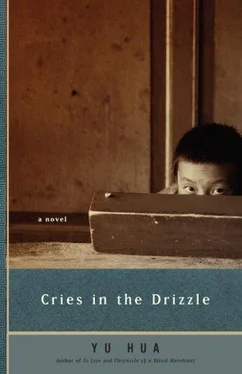The teacher nodded to me amicably. He was talking to another teacher, a smile on his face. As I stood there, I noticed that he was fiddling with a sheaf of papers in his hand, the first of which was Liu Xiaoqing's self-criticism. While he chatted with his colleague, he slowly turned over the pages, exposing all the confessions one after another. At the bottom of the pile I saw Guo-qing's self-criticism, written in very large characters. At this point the teacher turned around and asked me genially, “What about your self-criticism?”
That was when I fell to pieces. His display of my classmates’ confessions had sapped my courage, and I said with a stutter, “I haven't… quite finished it yet.”
“When will you have it done?” His inquiry was couched in a mild tone.
I replied eagerly, “I'll have it finished very soon.”
In my last year in Littlemarsh I entered fourth grade. One Saturday afternoon I was downstairs lighting the coal briquette stove when Guoqing and Liu Xiaoqing ran up and delivered a sensational piece of news: somebody had written a slogan in chalk on the wall of our classroom, calling for the ouster of our teacher. “Down with Zhang Qinghai!” it read.
They seemed unusually excited, complimenting me, saying what guts I had, how that damned Zhang Qinghai should have been overthrown long ago, what fiendish punishments we had all suffered at his hands. I found their excitement infectious. By heaping such honor on me for having written the slogan, they made me really wish I had. But I knew I should be honest, and I told them with a trace of embarrassment, “I didn't do it.”
The disappointment that I saw on their faces left me feeling bad. They seemed crushed to learn that I wasn't the fearless author, that there was no truth to Liu Xiaoqing's assertion of just a moment earlier, “You're the only one who would have the guts to do that.”
To my mind Guoqing was more daring than I was, and I said so, not at all out of modesty. Guoqing clearly accepted my tribute, because he nodded and said, “If you'd asked me to do it, I would have written it too.”
Liu Xiaoqing quickly chimed in with an identical comment, forcing me to say the same thing. I hated to disappoint them a second time.
I had walked into a trap, never thinking for one moment that Guoqing and Liu Xiaoqing had come at the teacher's behest to probe into my involvement. When Monday morning came around, fool that I was, I went off to school as happy as a lark. But before I knew it I had been led into a small room, where Zhang Qinghai and a woman teacher named Lin began to question me.
Teacher Lin first of all asked me if I knew about the slogan. There in that little room, with the door shut tight, the two grownups stared at me aggressively. I nodded and said I knew.
But when she asked me how I knew, I hesitated. Could I tell them how delighted Guoqing and Liu Xiaoqing had been? If they too were called in, what would they think of me? Surely they would denounce me as a traitor.
I looked at them tensely, still unaware that they suspected me. The woman teacher inquired in a sugary voice if I had come to school on Saturday afternoon or Sunday. I shook my head. I saw her give Zhang Qinghai a smile. Then, quick as a flash, she swiveled around and asked me, “So how do you know about the slogan?”
Her sudden question startled me. Zhang Qinghai, who had said nothing up to this point, asked me softly, “Why did you write the slogan?”
I was quick to defend myself. “I didn't write it.”
“Don't lie!” Teacher Lin thumped the table and went on. “You know about the slogan, and if you haven't come to school, how else could you know?”
I had no option but to reveal the role played by Guoqing and Liu Xiaoqing, otherwise I had no hope of clearing myself. But they showed not the slightest interest in my explanation of how I heard the news, and Zhang Qinghai told me point-blank, “I have compared the handwriting, and there's no question that it's yours.”
He said it with such confidence. Tears spilled from my eyes. I shook my head in desperation, pleading with them to believe me. By this time they were both sitting, and now they simply exchanged glances, paying no attention to my defense. My weeping was a magnet for my classmates, who clustered at the window to watch me cry — though the disgrace was the least of my problems. The woman teacher got up to drive them away and closed the window. First they had closed the door and now the window was closed too. Zhang Qinghai asked me, “Did you or did you not say that if you'd been asked, you would have written it?”
I looked at him, appalled. I had no idea how he knew this. Could he have eavesdropped on our Saturday-afternoon conversation?
The bell rang for the start of class, giving me a temporary respite. They told me to stand there and not move an inch while they went to teach their classes. After they left I stood alone in the small room; although there were chairs right next to me, I dared not sit down. There was a bottle of red ink on a desk, and I really wanted to pick it up and have a closer look at it, but they had said I was not to budge. All I could do was to look out the window at the playground. Children from higher grades lined up and then broke up into groups, to play ball or jump rope. Physical education was my favorite class. From the classroom opposite I could hear the faint sound of children reading aloud. I wished so much that I could be in among them, but I could only stand here in dishonor. Two older boys tapped on the window and I heard them calling, “Hey, why were you crying just now?”
More tears came, and I sobbed miserably. On the other side of the window they had a big laugh.
After the bell for the end of class I saw Zhang Qinghai leading Guoqing and Liu Xiaoqing over. I wondered how they had come into the picture and thought it must have been because I had implicated them. They saw me through the window, and their eyes rested on me for just a second before turning away in scorn.
I was devastated by what happened next. Guoqing and Liu Xiaoqing informed against me, testifying that on Saturday afternoon I had said, “If you'd asked me, I would have written it.” Teacher Lin pointed a finger in my direction as she turned to Zhang Qinghai and said, “If this is the way he thinks, then he's certainly up to writing that slogan.”
“But they said the same thing!” I protested.
Guoqing and Liu Xiaoqing quickly put this in context for the teachers: “We said that only to draw him out.”
I looked at them in despair while they glared at me. The teachers told them to leave.
What a harrowing morning that was. The two grown-ups took turns attacking me, but I stuck to my story as the tears streamed down my face. They managed to cow me by yelling all of a sudden or banging the table impatiently, and there were several moments when I was so frightened that I trembled all over and could not say a word. Teacher Lin used every threat in the book, short of vowing to shoot me. In the end, she turned gentle and told me patiently that the Public Security Bureau had an apparatus used to analyse handwriting, and just a short test could establish that the writing in the slogan was identical to that in my homework notebook. This was the only ray of hope that came my way the whole morning, but at the same time I was worried that the device might make a mistake, so I asked her, “Could it get things wrong?”
“Impossible.” She shook her head emphatically.
This was an enormous relief, and I said to them happily, “Then hurry up and do the test.”
But they remained fixed in their chairs, looking at each other for quite some time. Finally Zhang Qinghai said, “You may go home for now.”
The bell for the end of the session had already rung by then, and finally I could leave the little room. Though I had temporarily regained my freedom, I was still confused about everything that had happened. Somehow, in my dazed state, I managed to make my way to the school gate, and there I spotted Guoqing and Liu Xiaoqing. Tears spilled from my eyes at the thought of their betrayal, and I went up to them and said, “How could you do that?”
Читать дальше












